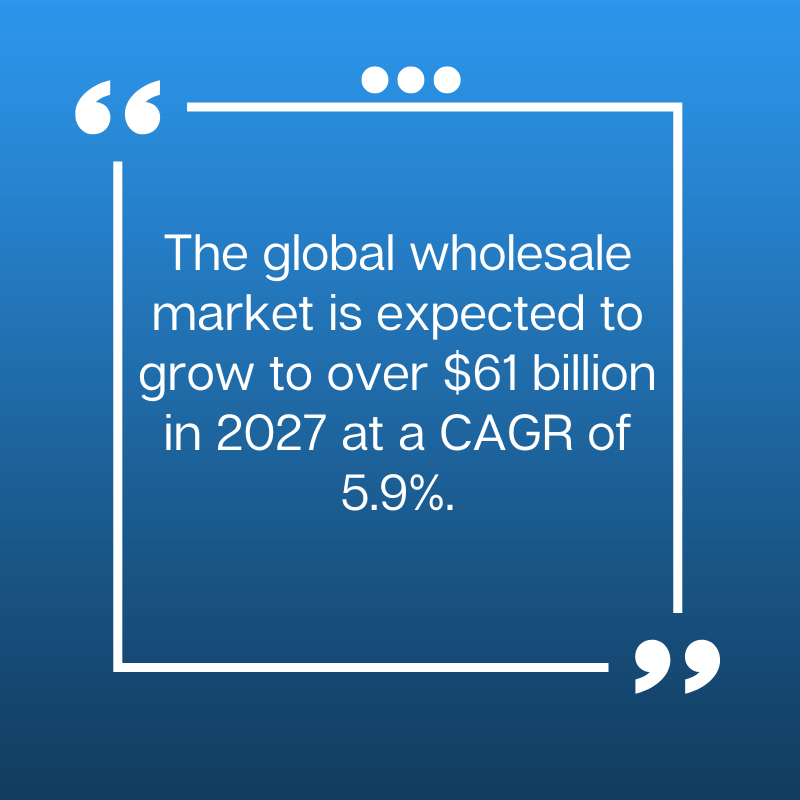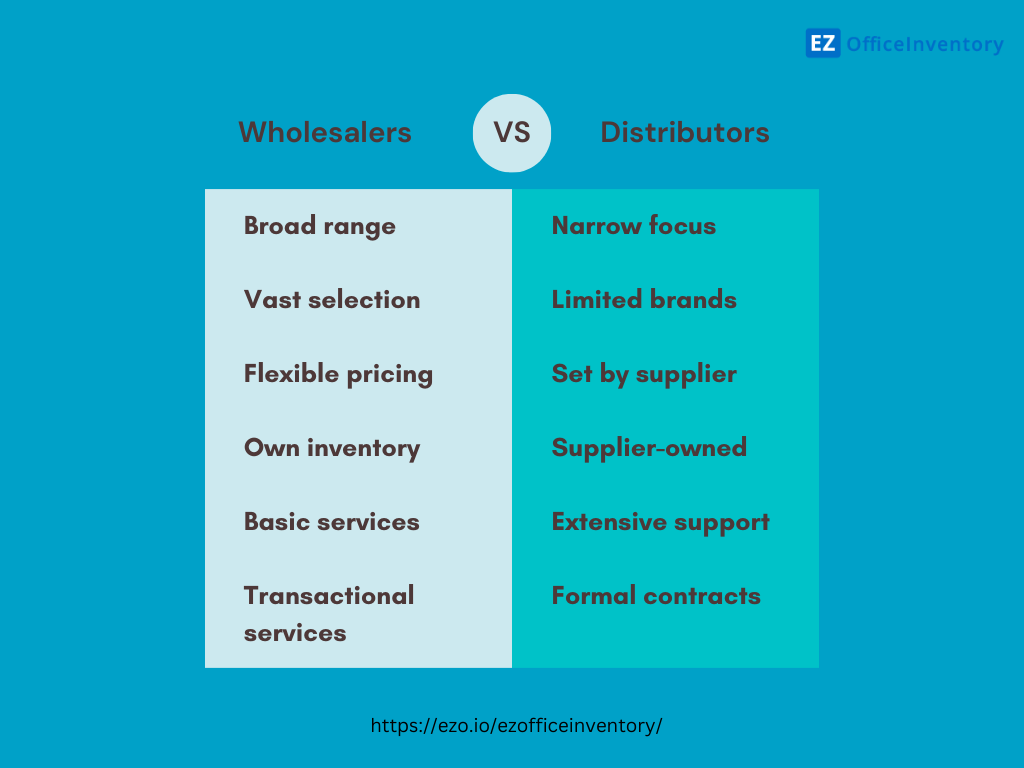Wholesalers and distributors are key intermediaries connecting manufacturers and retailers. The global wholesale market is expected to grow at a CAGR of 5.9% to over US$61 billion by 2027, providing businesses with opportunities to expand their business reach by leveraging wholesalers and distributors. Many businesses use these terms interchangeably, although they refer to different supply chain roles.
This article introduces wholesalers and distributors, including their business models, functions, types of products they sell, and ideal use cases. Whether you are a manufacturer looking to improve your distribution network or a retailer sourcing new inventory, this guide will help you determine whether you should work with a wholesaler or distributor to optimize your supply chain. Let’s dive in!

What is a wholesaler?
Wholesalers play a key role in the supply chain, buying large quantities of products from manufacturers and selling smaller quantities to retailers, commercial businesses or consumers. They act as intermediaries between manufacturers and sellers and help distribute products to consumers in a more efficient manner.
Without wholesalers, retailers would face significant challenges sourcing products directly from hundreds of different manufacturers. Wholesalers can get goods to market more efficiently. For manufacturers and retailers, working with the right wholesaler can provide wider distribution and increase sales.
Common wholesaler types
Wholesalers can be divided into several types, such as:
Cash and Carry Wholesaler
Cash and carry wholesalers, also known as warehouse wholesalers, sell a variety of goods to retailers, businesses, and other wholesalers. Retailers visit warehouses, place orders, and pay cash to ship the products themselves. Cash and carry wholesalers offer a wide range of general merchandise at low prices.
Full Service Wholesaler
Full-service wholesalers not only sell products from a warehouse but also provide services such as delivery, customer support, and product promotions. They have a sales team that interacts directly with customers. Full-service wholesalers carry a variety of products and sometimes specialize in a certain industry.
Professional wholesaler
Specialty wholesalers focus on distributing a specific type of product or service. Such as agricultural product wholesalers, seafood wholesalers and pharmaceutical wholesalers. These wholesalers sell products that require special handling, storage, or shipping. Their expertise comes from focusing on specific product categories.
What is a dealer?
Like wholesalers, distributors act as middlemen for products between manufacturers and retailers. But distributors play a more professional role. They focus on localized distribution of manufacturer’s products by taking ownership of the goods. Distributors can achieve targeted product distribution and brand building by providing services such as sales, marketing, warehousing, delivery and customer service locally.
Distributors enable manufacturers to focus on making products rather than managing complex logistics. And they enable more efficient distribution than manufacturers can achieve on their own. Distributors serve specific areas and understand the retailers in those areas.
Common types of distributors
Distributors can be of many types, including:
exclusive distributor
Exclusive distributors sign an agreement with a manufacturer to sell and sell their products only within a specified geographic area. This exclusivity allows them to specialize in catering to the needs of these specific products. They become experts in the brands they distribute. Their exclusivity ensures that they are fully committed to driving the growth of these products.
value added reseller
Value-added distributors provide important services in addition to accepting and fulfilling retailers’ orders. They focus not only on distribution logistics but also on building the brand of their distribution. Common value-added services include customized marketing for each region, managing the warranty and returns process, providing field sales representatives, tracking retailer sales data, and providing customer support.
Professional dealer
Specialty distributors focus their distribution services within a specific product category or industry, such as pharmaceuticals, automotive, electronics, or food and beverages. Their dedicated expertise enables them to provide targeted distribution services to retailers of these products. They understand the unique needs, regulations, handling and storage requirements that come with distributing more specialized products.
Key Differences Between Wholesalers and Distributors
Wholesalers and distributors differ in the following ways:
Target customers
Wholesalers have a very broad target customer base, including retailers of all sizes, business-to-business customers, government agencies, other wholesalers further down the distribution chain, and in some cases individual consumers. Their goal is to sell their extensive product portfolio to any business or entity that wants to buy from them.
Distributors have a very narrow customer focus, selling primarily to retailers representing the specific manufacturer they represent. Their distribution services are dedicated to shipping suppliers’ products to retailers in their designated regions. They develop close relationships with these retailers to promote the supplier’s brand.

Product Range
Wholesalers offer an extremely wide and diverse range of products from hundreds or thousands of different brands and manufacturers. Their role is to integrate products across industries for resale to different customer segments. They don’t limit themselves to certain brands.
Instead, distributors only market and sell products from manufacturers with whom they have agreements. Each distributor represents a certain number of brands and provides in-depth distribution services for specific products within their territory. They focus on specializing in the brands they distribute rather than offering a wide variety of products.
Pricing and Discounts
Wholesalers set their own competitive prices for products and offer discounts or offers to attract different types of buyers. They have the flexibility to adjust pricing to attract customers and increase sales. Their discounts may vary from customer to customer.
Instead, distributors must abide by the pricing terms set by the manufacturers they distribute. They cannot adjust pricing on their own. However, dealers may offer promotional prices, discounts, or retailer incentives as long as they are consistent with the manufacturer’s policies and sales goals. Their role is to promote the brand according to supplier guidelines.
Inventory type
Wholesalers have legal title to their various inventories that they purchase in bulk directly from many manufacturers and suppliers. This inventory is stored in the wholesaler’s own warehouse or facility until it is sold and shipped to its customer base. Wholesalers buy and own the goods.
In contrast, distributors typically do not hold legal title to inventory. They do not purchase and own the products they distribute. Instead, distributors facilitate the sale and distribution of products on behalf of the manufacturers with whom they have agreements. The supplier retains title and the goods remain with the distributor.
Value-added services
Wholesalers provide basic services that facilitate transactions, such as bulking products into smaller quantities, warehousing/storage, delivery to customers, and some customer service. Their core function is to aggregate inventory for resale.
Unlike wholesalers, distributors provide a wide range of value-added services to support product sales, positioning and development of the brands they distribute. This can include marketing, sales support, order processing, managing warranties, providing field representation, and providing extensive customer service. They focus on brand building rather than just order fulfillment.
Contractual relationship
Wholesalers have non-contractual transactional relationships with the various suppliers from whom they purchase inventory. There is no binding contractual agreement on the terms of the relationship between wholesaler and supplier. Purchases are typically made under separate purchase orders.
Instead, distributors enter into formal contractual agreements with each manufacturer they choose to represent. These legally binding contracts detail the exclusivity terms that dealers must adhere to when representing and selling the supplier’s brand in their designated territories.
in conclusion
Both wholesalers and distributors facilitate product distribution, but in different ways. Key differences include their customer targets, product range, inventory ownership, pricing controls and supplier contracts. Wholesalers operate a wide range of products, while distributors specialize in distribution. Understanding its unique capabilities, assets, and relationships enables manufacturers and retailers to choose the best distribution method based on their needs and optimize supply chain efficiency.
EZOfficeInventory can help you optimize your distribution operations by tracking goods in complex supply chains. Its powerful features help you track purchase orders, receive inventory, manage suppliers and analyze purchasing data. By tightly controlling inventory, costs and supplier relationships, EZOfficeInventory enables businesses to scale and achieve distribution success.
Frequently Asked Questions (FAQ)
1. What is the difference between wholesalers, distributors and retailers?
Wholesalers sell in bulk to commercial buyers at low prices. Distributors represent and promote the brand in the region, as well as provide logistics and other services. Retailers buy inventory from wholesalers and distributors and sell it individually to consumers through stores and websites.
2. What are the main differences between wholesalers and distributors?
Wholesalers and distributors both deal in bulk commodities but play different roles. Wholesalers buy large quantities from manufacturers and resell small quantities to retailers. Distributors, on the other hand, only represent manufacturers in certain regions. They actively promote and sell the manufacturer’s products and sometimes provide additional services such as warehousing and logistics.
3. How to effectively manage suppliers?
Effectively managing suppliers and procurement is key to supply chain success. Solutions like EZOfficeInventory provide a powerful, centralized platform to control the entire process – from purchase orders to receiving inventory to analyzing costs. This enables you to build strategic relationships with suppliers, reduce expenses and optimize your supply chain.